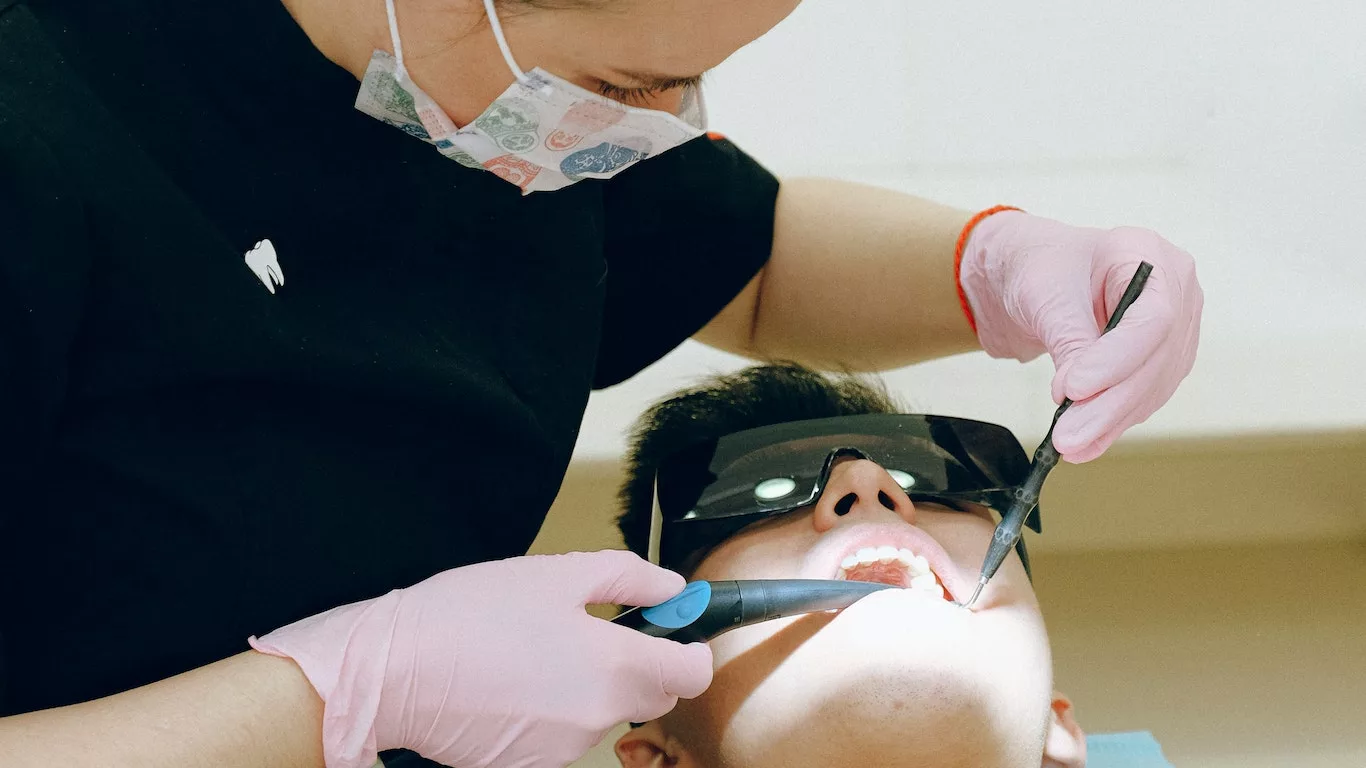Veneers for Missing Teeth: Restoring Your Smile & Confidence
Discover how dental veneers can restore your smile, boost confidence, and improve dental functionality in our comprehensive guide on addressing missing teeth with veneers.
Dental veneers, often hailed as a versatile cosmetic dentistry solution, are not just about enhancing the aesthetics of your teeth. They can be a transformative option for individuals grappling with the challenges posed by missing teeth. In this comprehensive guide, we will delve deeper into the world of veneers for missing teeth, exploring their advantages, types, application process, benefits, candidacy criteria, and cost considerations.
Introduction
Dental veneers have been a game-changer in cosmetic dentistry, offering people an opportunity to achieve the smile of their dreams. What many may not realize is that veneers can also serve as an innovative solution for missing teeth. The impact of missing teeth extends beyond mere aesthetics; it affects speech, chewing, and overall confidence. In this article, we aim to shed light on how veneers, typically associated with smile makeovers, can address the specific issue of missing teeth. Whether you’re seeking to improve your appearance, boost self-esteem, or restore dental functionality, veneers might just be the answer you’ve been looking for.

Why Choose Veneers for Missing Teeth
Advantages Over Other Dental Procedures
The versatility of veneers lies in their ability to address a multitude of dental issues, including missing teeth. Unlike dental implants, which require invasive surgery and can be time-consuming, veneers offer a less invasive and quicker solution. Additionally, veneers can be more cost-effective than implants and provide immediate results. While dentures are an option, they can sometimes be less stable, leading to discomfort and self-consciousness. Veneers offer a happy medium, combining the benefits of both implants and dentures.
Aesthetics and Functionality for Missing Teeth
Beyond just filling the gaps left by missing teeth, veneers excel at improving overall oral aesthetics. They are meticulously crafted to blend seamlessly with your natural teeth, creating a harmonious, attractive smile. Furthermore, veneers are customized to address not just the appearance but also the functionality of your teeth. For those with missing teeth, this means regaining the ability to chew comfortably, speak clearly, and confidently display their smile.

Types of Veneers for Missing Teeth
Diving into Your Options
Understanding the different types of veneers is crucial when considering treatment for missing teeth.
- Porcelain Veneers: Porcelain veneers are known for their lifelike appearance and durability. They are an excellent choice for addressing missing teeth as they are custom-made to match the color, shape, and size of your natural teeth.
- Composite Resin Veneers: These veneers are a more budget-friendly option and can be applied directly to the teeth. While they may not last as long as porcelain veneers, they still provide a viable solution for missing teeth.
- Lumineers: If you’re looking for a minimally invasive option to cover missing teeth, Lumineers may be the answer. They require little to no tooth reduction, making them a suitable choice for those with missing teeth who want to preserve as much of their natural tooth structure as possible.

The Veneer Application Process for Missing Teeth
Consultation and Assessment for Missing Teeth
Before undergoing any dental procedure, including veneers for missing teeth, it’s crucial to have a comprehensive consultation and assessment. During this phase, your dentist will evaluate your oral health, discuss your goals, and determine the suitability of veneers for your specific situation. They will also address any underlying issues, such as gum disease or cavities, which need to be treated before veneer placement.
Preparing the Teeth with Missing Teeth
The preparation of teeth for veneers is a minimally invasive process, making it an attractive option, especially for individuals with missing teeth. The dentist will remove a small amount of enamel from the front surface of the teeth to create a bonding surface for the veneers. In cases of missing teeth, this step is crucial to ensure that the veneers align properly with the surrounding natural teeth.
Veneer Design and Fabrication for Missing Teeth
The design and fabrication of veneers are highly personalized processes. In the case of missing teeth, precision is essential to ensure that the veneers seamlessly integrate with the rest of your teeth. Your dentist will take impressions of your teeth and work closely with a dental laboratory to create veneers that match the color, shape, and size of your natural teeth.
Veneer Placement for Missing Teeth
The final step in the veneer application process is the placement of the veneers. The dentist will carefully bond the veneers to your teeth, ensuring a secure and precise fit. In the case of missing teeth, this step requires meticulous attention to detail to ensure that the veneers fill the gaps seamlessly.

Benefits of Veneers for Missing Teeth
Improved Appearance with Missing Teeth
One of the most immediate and noticeable benefits of veneers is the improvement in your appearance, especially when dealing with missing teeth. Veneers not only fill the gaps but also create a uniform and aesthetically pleasing smile. The transformation can be truly remarkable, boosting your self-esteem and allowing you to smile with confidence.
Enhanced Confidence Despite Missing Teeth
Missing teeth can take a significant toll on your self-confidence. You may feel self-conscious about smiling or even speaking in public. Veneers offer a solution that goes beyond aesthetics. They provide psychological benefits by restoring your confidence and enabling you to engage more freely in social situations. You can once again enjoy smiling without reservation.
Restored Dental Functionality for Missing Teeth
Beyond the cosmetic enhancements, veneers also play a crucial role in restoring dental functionality, which can be compromised when you have missing teeth. With veneers, you can comfortably chew your favorite foods, speak clearly, and enjoy improved overall oral function. This aspect is particularly important for individuals with missing teeth who want to maintain their quality of life.

Candidates for Veneers with Missing Teeth
Who Is a Suitable Candidate for Treating Missing Teeth?
While veneers are a versatile solution, not everyone with missing teeth is an ideal candidate. The suitability of veneers depends on various factors, including the number and location of missing teeth, the overall health of your mouth, and your expectations. Generally, veneers work best for individuals with minor to moderate tooth loss and good oral health. For those with extensive tooth loss or significant oral health issues, alternative options may be recommended, such as dental implants or dentures.
Considerations for Oral Health and Missing Teeth
Maintaining good oral health is essential when considering veneers, especially for individuals with missing teeth. Gum disease, cavities, and other oral health issues should be addressed before veneer placement to ensure long-term success. It’s crucial to work closely with your dentist to create a treatment plan that takes into account both your cosmetic goals and your overall oral health.

Veneers vs. Dental Implants vs. Dentures for Missing Teeth
A Comparative Analysis for Missing Teeth
When it comes to replacing missing teeth, veneers are just one option among several, including dental implants and dentures. Let’s take a closer look at how these options compare when dealing with missing teeth:
- Veneers: Veneers are primarily a cosmetic solution for missing teeth. While they can improve the appearance and functionality of your teeth, they are not a direct replacement for missing teeth. Instead, they cover existing teeth and fill gaps, making them suitable for cases of minor to moderate tooth loss.
- Dental Implants: Dental implants are considered the gold standard for replacing missing teeth. They involve the surgical placement of artificial tooth roots (implants) into the jawbone, followed by the attachment of prosthetic teeth (crowns). Dental implants provide excellent stability, functionality, and longevity, making them a suitable option for those with missing teeth who seek a permanent solution.
- Dentures: Dentures are removable appliances that replace missing teeth. They are a more affordable option compared to dental implants and can be a suitable choice for individuals with extensive tooth loss. Dentures can restore the appearance and some functionality of the teeth but may require regular adjustments and maintenance.
Making the Right Choice for Replacing Missing Teeth
The decision between veneers, dental implants, or dentures when addressing missing teeth depends on various factors, including:
- The extent of tooth loss
- Oral health status
- Budget considerations
- Desired treatment timeline
- Aesthetic preferences
It’s essential to consult with your dentist to evaluate your specific needs and determine the most appropriate solution for replacing missing teeth.

Cost of Veneers for Missing Teeth
Factors Influencing the Price for Missing Teeth Solutions
Understanding the cost factors associated with veneers, especially when dealing with missing teeth, can help you make an informed decision. Several factors influence the cost of veneers:
- The number of veneers needed
- The type of veneer material chosen (porcelain, composite resin, Lumineers)
- The complexity of the veneer placement procedure
- Geographic location and the expertise of the dentist
- Additional treatments required (e.g., oral health treatments before veneer placement)
Dental Insurance and Veneers
It’s important to note that dental insurance typically does not cover the cost of veneers when they are primarily for cosmetic purposes. However, in cases where veneers are used to restore functionality in the presence of missing teeth, there may be partial coverage.
Affordable Options and Financing for Missing Teeth Solutions
Financing your dental work, especially when addressing missing teeth, is a common concern. To make veneers more accessible, many dental practices offer flexible payment plans and financing options. These arrangements allow you to spread the cost of veneers over time, making the transformation of your smile more manageable within your budget.
Additionally, some dental schools and clinics may offer discounted rates for veneer procedures performed by dental students under the supervision of experienced faculty. While this option may be more affordable, it’s important to weigh the potential trade-offs in terms of treatment duration and expertise.

Maintaining Veneers with Missing Teeth
Oral Care Tips for Veneers and Missing Teeth
Preserving the longevity and appearance of your veneers is essential, particularly when dealing with missing teeth. Here are some oral care tips specific to veneers:
- Maintain good oral hygiene: Brush your teeth at least twice a day with a soft-bristle toothbrush and fluoride toothpaste. Floss daily to remove plaque and food particles from between your teeth.
- Avoid excessive force: While veneers are durable, they are not indestructible. Avoid using your teeth as tools for opening packages or biting into hard objects.
- Wear a mouthguard: If you engage in contact sports or have a tendency to clench or grind your teeth at night, consider wearing a custom-made mouthguard to protect your veneers and natural teeth.
- Regular dental check-ups: Schedule regular dental check-ups and cleanings to monitor the condition of your veneers and address any issues promptly.
Longevity and Durability of Veneers for Replacing Missing Teeth
Veneers are designed to be durable and long-lasting, with an average lifespan of 10 to 15 years or even longer with proper care. However, several factors can influence the longevity of your veneers:
- Oral hygiene: Good oral hygiene practices are crucial for maintaining the condition of your veneers. Proper brushing, flossing, and regular dental check-ups are essential.
- Diet: Be mindful of your diet to prevent damage to your veneers. Avoid biting into extremely hard or sticky foods that can put excessive force on your veneers.
- Teeth grinding: If you grind your teeth at night (bruxism), it can wear down your veneers over time. A nightguard can help protect your veneers from the effects of grinding.
- Trauma: Accidents or injuries to the mouth can damage veneers. If you experience any trauma to your teeth or face, seek immediate dental care.
By following these guidelines and practicing good oral care, you can maximize the lifespan of your veneers, ensuring a long-lasting solution for addressing missing teeth.

Potential Risks and Side Effects with Veneers for Missing Teeth
Sensitivity and Discomfort with Missing Teeth Solutions
After the placement of veneers, it’s common to experience some sensitivity or discomfort, especially when dealing with missing teeth. This discomfort is usually temporary and can be managed with over-the-counter pain relievers. Your dentist may also recommend a toothpaste formulated for sensitive teeth to alleviate any sensitivity.
Addressing Complications when Treating Missing Teeth
While veneers are generally safe and well-tolerated, complications can occasionally arise, particularly when treating missing teeth. Here are some potential issues and how to address them:
- Veneer damage: Veneers can chip or crack, especially if subjected to excessive force. If this occurs, contact your dentist for repair or replacement.
- Gum issues: In some cases, veneers may not sit perfectly along the gumline, leading to gum irritation or inflammation. Your dentist can adjust the veneers to alleviate this discomfort.
- Color discrepancies: Over time, the color of veneers may change or become stained. Regular dental cleanings and maintenance can help address this issue.
- Veneer detachment: While rare, veneers can become detached from the teeth. If this happens, see your dentist immediately for reattachment.
Frequently monitoring your veneers and maintaining regular dental check-ups will help catch and address any complications early, ensuring the longevity and success of your veneers, especially when dealing with missing teeth.

Conclusion
In conclusion, veneers offer a promising solution for individuals dealing with the challenges posed by missing teeth. Whether it’s about appearance, confidence, or functionality, veneers can help you regain your smile and improve your quality of life. We strongly encourage you to consult with a dentist to explore how veneers can address your unique concerns related to missing teeth. Remember that veneers are not just about aesthetics; they can be a life-changing solution that goes beyond the surface, helping you reclaim your smile and confidence.
Appendices
References
- Peumans, M., Van Meerbeek, B., & Lambrechts, P. (1996). The 5-year clinical performance of direct composite additions to correct tooth form and position. IADR/AADR/CADR 74th General Session, 951.Link
- Sailer, I., Pjetursson, B. E., Zwahlen, M., & Hämmerle, C. H. (2007). A systematic review of the survival and complication rates of all-ceramic and metal–ceramic reconstructions after an observation period of at least 3 years. Part I: Single crowns. Clinical Oral Implants Research, 18(Suppl 3), 73-85.Link
- Gurel, G., Morimoto, S., Calamita, M. A., & Coachman, C. (2013). Clinical performance of porcelain laminate veneers: outcomes of the aesthetic pre-evaluative temporary (APT) technique. International Journal of Periodontics & Restorative Dentistry, 33(5), 557-567.Link
Frequently Asked Questions (FAQs) about Veneers for Missing Teeth
Common Queries About Veneers and Missing Teeth
We’ve gathered answers to some of the most frequently asked questions regarding veneers for addressing missing teeth:
- Can veneers replace missing teeth completely? Veneers are not a direct replacement for missing teeth; they cover existing teeth. However, they can fill gaps and create the appearance of a full smile.
- Do veneers require special care for missing teeth? While veneers don’t require extensive care, it’s essential to maintain good oral hygiene and avoid excessive force on them, especially when dealing with missing teeth.
- How long do veneers last for missing teeth? Veneers typically last 10 to 15 years or longer with proper care, making them a durable solution for missing teeth.
- Can veneers be combined with other treatments for missing teeth? Yes, veneers can be used in conjunction with other treatments, such as dental implants or bridges, to address missing teeth and achieve the desired results.
Expert Answers for Replacing Missing Teeth
Our experts provide in-depth responses to your questions about veneers and their suitability for replacing missing teeth:
- Are veneers suitable for individuals with multiple missing teeth? Veneers work best for those with minor to moderate tooth loss. In cases of extensive tooth loss, alternative solutions like dental implants or dentures may be recommended.
- How do veneers impact oral function when there are missing teeth? Veneers can significantly improve oral function by providing a more even and functional bite. They help with chewing and speaking, even when dealing with missing teeth.
- Can veneers improve the appearance of teeth adjacent to missing teeth? Yes, veneers can enhance the appearance of adjacent teeth, creating a uniform and aesthetically pleasing smile, even when there are missing teeth.
- What maintenance is required for veneers when addressing missing teeth? Routine oral care, including brushing, flossing, and regular dental check-ups, is essential for maintaining the condition of veneers, especially when dealing with missing teeth.
Table
Here’s a sample table related to the article:
| Aspect | Veneers | Dental Implants | Dentures |
|---|---|---|---|
| Appearance | Aesthetic solution | Natural look and feel | Appearance may vary |
| Functionality | Improved chewing | Restores full function | Functional but may slip |
| Longevity | 10-15 years | Long-lasting | May require replacement |
| Suitability | Minor to moderate | Extensive tooth loss | Extensive tooth loss |
| Cost | Moderate | Higher cost | Affordable |
Disclaimer
The information provided in this article is for educational and informational purposes only. It is not intended as professional dental advice, diagnosis, or treatment. Always seek the advice of your dentist or other qualified healthcare provider with any questions you may have regarding a dental condition. Any reliance you place on the information in this article is at your own risk. The author and the publisher disclaim any liability for any adverse effects arising directly or indirectly from the information provided in this article.

Camellia Wulansari is a dedicated Medical Assistant at a local clinic and a passionate health writer at Healthusias.com. With years of hands-on experience in patient care and a deep interest in preventive medicine, she bridges the gap between clinical knowledge and accessible health information. Camellia specializes in writing about digestive health, chronic conditions like GERD and hypertension, respiratory issues, and autoimmune diseases, aiming to empower readers with practical, easy-to-understand insights. When she’s not assisting patients or writing, you’ll find her enjoying quiet mornings with coffee and a medical journal in hand—or jamming to her favorite metal band, Lamb of God.







